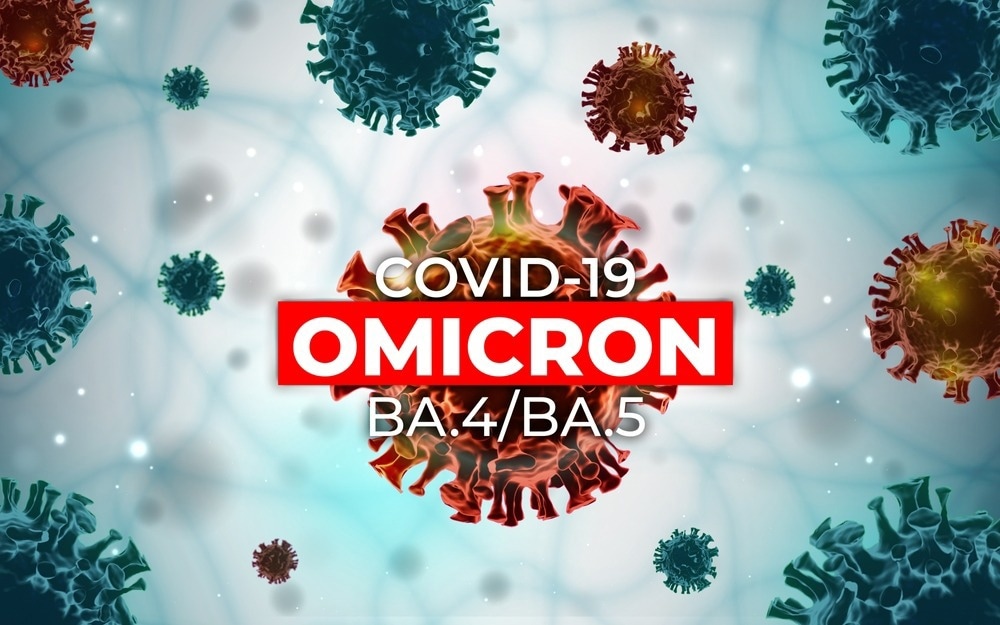In a recent study posted to the bioRxiv* preprint server, researchers compared the levels of cross-reactive neutralizing antibodies elicited by severe acute respiratory syndrome coronavirus 2 (SARS-CoV-2) Omicron BA.4 and BA.1 infections.
 Study: SARS-CoV-2 BA.4 infection triggers more cross-reactive neutralizing antibodies than BA.1. Image Credit: Mayboon/Shutterstock
Study: SARS-CoV-2 BA.4 infection triggers more cross-reactive neutralizing antibodies than BA.1. Image Credit: Mayboon/Shutterstock

 This news article was a review of a preliminary scientific report that had not undergone peer-review at the time of publication. Since its initial publication, the scientific report has now been peer reviewed and accepted for publication in a Scientific Journal. Links to the preliminary and peer-reviewed reports are available in the Sources section at the bottom of this article. View Sources
This news article was a review of a preliminary scientific report that had not undergone peer-review at the time of publication. Since its initial publication, the scientific report has now been peer reviewed and accepted for publication in a Scientific Journal. Links to the preliminary and peer-reviewed reports are available in the Sources section at the bottom of this article. View Sources
The SARS-CoV-2 Omicron variant of concern has evolved into various sub-lineages such as BA.2, BA.2.12.1, BA.4, and BA.5. While the BA.4 and BA.5 lineages have the same dominant spike gene mutation, they differ with respect to non-structural proteins (NSPs) and matrix and nucleocapsid genes. Hence, BA.4 has displayed increased resistance to antibody neutralization by vaccinee and convalescent sera as well as monoclonal antibodies.
About the study
In the present study, researchers investigated the cross-reactivity of neutralizing antibodies (nAbs) elicited by SARS-CoV-2 Omicron BA.4 infection among unvaccinated and previously vaccinated individuals.
The team collected plasma samples from individuals diagnosed with coronavirus disease 2019 (COVID-19) during the fifth wave of the pandemic in South Africa. These samples used to estimate the neutralization cross-reactivity were collected from 35 hospitalized COVID-19 positive patients who were admitted to the Tshwane District Hospital between 9 May and 22 May 2021. The team performed whole genome sequencing (WGS) and collected data having over 50% genome coverage in the case of 70% of the patients, among which 67% could be associated with a specific lineage or clade.
Furthermore, the team screened the plasma samples collected from the unvaccinated patients against the matched BA.4 or BA.5 pseudovirus sequence. A lentiviral pseudovirus neutralization assay was also employed to estimate the cross-reactivity to the SARS-CoV-2 D614G, Beta, and Delta variants and Omicron BA.1, BA.2, and BA.4 sub-lineages.
Results
The study results showed according to the clade and lineage assignment performed with WGS, 79% of the infections were caused by the SARS-CoV-2 Omicron BA.4 sub-lineage while 21% were by the BA.5 sub-lineage. Among the patient cohort, 13 had a history of a minimum of one Ad26.CoV2.S vaccine dose and two BNT162b2 vaccine doses at least 56 to 163 days before COVID-19 diagnosis. Furthermore, 22 patients were unvaccinated and reported no previous symptomatic SARS-CoV-2 infection.
The team also observed that 41% of the plasma samples obtained from unvaccinated individuals displayed no detectable neutralization. Additionally, a higher number of non-responders, or individuals who did not exhibit any autologous responses to BA.4 or BA.5, was observed for the BA.4 or BA.5 wave of infections than for the BA.1 wave. Furthermore, 88.9% of the unvaccinated non-responders were admitted to the hospital for non-COVID-19 reasons and were detected with asymptomatic or mild COVID-19 infection incidentally. On the other hand, the team noted that 25% of vaccinated patients were non-responders, all reporting a history of Ad26.CoV2.S vaccination.
Furthermore, the team observed that the unvaccinated individuals displayed moderate antibody titers in response to the matched BA.4 or BA.5 spike genes. These titers corresponded to the mild or asymptomatic infections observed in these individuals. The reduction in the nAb titers was variable among the variants of concern as the titers were observed against Beta. BA.2 and D614G were substantially lower than those against BA.4 or BA.5. Moreover, titers estimated against BA.1 infections were two times lower than those against BA.4 or BA.5 infections.
The study also showed that the breakthrough COVID-19 infections noted after vaccination resulted in substantially increased antibody titers. Titers were found to be notably higher against D614G while the titers were reduced against the SARS-CoV-2 Beta, Delta, and BA.1. The team also observed that while the responses elicited by Beta, BA.4, and BA.5 were highly cross-reactive, those observed against Delta and BA.1 were significantly less cross-reactive with 10 to 100 times reduction in antibody titers.
Conclusion
The study findings showed that compared to the neutralizing antibodies triggered by SARS-CoV-2 Omicron BA.1 sub-lineage with limited cross-reactivity, BA.4 and BA.5 elicit highly cross-reactive neutralizing antibodies. This suggested that the newly developed COVID-19 vaccines must possess an enhanced breadth of neutralization to curb Omicron transmission.

 This news article was a review of a preliminary scientific report that had not undergone peer-review at the time of publication. Since its initial publication, the scientific report has now been peer reviewed and accepted for publication in a Scientific Journal. Links to the preliminary and peer-reviewed reports are available in the Sources section at the bottom of this article. View Sources
This news article was a review of a preliminary scientific report that had not undergone peer-review at the time of publication. Since its initial publication, the scientific report has now been peer reviewed and accepted for publication in a Scientific Journal. Links to the preliminary and peer-reviewed reports are available in the Sources section at the bottom of this article. View Sources
Journal references:
- Preliminary scientific report.
Richardson, S. et al. (2022) "SARS-CoV-2 BA.4 infection triggers more cross-reactive neutralizing antibodies than BA.1". bioRxiv. doi: 10.1101/2022.07.14.500039. https://www.biorxiv.org/content/10.1101/2022.07.14.500039v1
- Peer reviewed and published scientific report.
Richardson, Simone I., Vimbai Sharon Madzorera, Holly Spencer, Nelia P. Manamela, Mieke A. van der Mescht, Bronwen E. Lambson, Brent Oosthuysen, et al. 2022. “SARS-CoV-2 Omicron Triggers Cross-Reactive Neutralization and Fc Effector Functions in Previously Vaccinated, but Not Unvaccinated, Individuals.” Cell Host & Microbe, March. https://doi.org/10.1016/j.chom.2022.03.029, https://www.cell.com/cell-host-microbe/fulltext/S1931-3128(22)00159-7